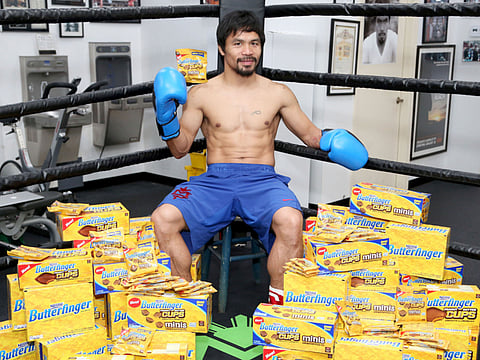Mayweather vs Pacquiao: The staggering financial breakdown
Where the money will go: The staggering financial breakdown of Mayweather vs Pacquiao

Los Angeles: No matter who wins the richest boxing match in history on May 2, Manny Pacquiao will receive part of his payday the next business day from his promoter, Bob Arum.
“On Monday morning, I will hand Manny a cheque for $50 million (Dh184m) as a down payment, guaranteed,” Arum said.
It is a bit more complicated than that — it is a wire transfer, actually, and 30 per cent of it will be shaved off for the Internal Revenue Service, Arum said. But the bottom line is that the long-anticipated championship welterweight match between Pacquiao and Floyd Mayweather Jr. will earn hundreds of millions of dollars, mostly for the fighters.
Mayweather will receive a substantial portion of his earnings immediately after the fight, said Leonard Ellerbe, chief executive of Mayweather Promotions. He would not disclose how much.
“I will tell you this,” Ellerbe said. “Floyd Mayweather’s check will be a lot more than $50 million. And then it goes from there.”
The contract calls for Mayweather to receive 60 per cent of the revenues. Pacquiao will get 40 per cent. When all the accounting is done, each man should make well over $100 million, about double the biggest previous boxing payout, demonstrating that boxing’s slow fade in popular culture has not diminished the potential returns of the biggest bouts.
“This is a unique situation, the confluence of time and event — the two biggest fighters in the world coming together,” said Ken Hershman, the president of HBO Sports.
Mayweather (47-0) and Pacquiao (57-5-2) are generally regarded as the two best fighters, perhaps in any weight class, of the past decade. But tangled in boxing’s familiar knot of egos, contracts and self-preservation, a head-to-head bout looked unlikely as the aging boxers (Mayweather is 38, Pacquiao is 36) moved toward retirement.
A chance face-to-face meeting between Mayweather and Pacquiao at a Miami Heat game in January prompted true negotiations between the two sides, with Pacquiao agreeing to second billing in promotional materials and a lower percentage of the payout.
“We’re both bigger names than we were five, six years ago,” Mayweather said at his gym in Las Vegas on Tuesday. “We’re meeting at the pinnacle of our careers. The time is right.”
The numbers are dizzying, even for Mayweather, nicknamed Money, whose estimated $105 million for two fights last year made him the world’s highest-paid athlete. To keep it straight, HBO and Showtime, rival networks co-producing and co-distributing the pay-per-view event in a rare agreement, have created a central accounting system.
HBO has a long-term contract with Pacquiao, while Showtime has rights to Mayweather’s fights. The only other time the networks worked together in such a way was when Mike Tyson fought Lennox Lewis in 2002.
“They distribute the revenue in accordance with the contracts of the two fighters, so that there is no side money,” Arum said. “We felt that this was the most reasonable way to go. It’s the way we’ve done it to prevent the accusations that we usually get, that this promoter is stealing from that promoter.”
All revenue from the fight — the foreign broadcast rights, closed-circuit income from bars and theaters, ticket sales, sponsorships, merchandise sales and so on — goes into the pot. That will be about $130 million.
The biggest revenue stream will come from the pay-per-view broadcast, sold to households by cable systems and satellite providers at a suggested price of $89.95. Mayweather’s 2007 defeat of Oscar De La Hoya was purchased by nearly 2.5 million households, but expectations are that this one will easily surpass that mark. Some suggest it could be bought and seen in 4 million homes.
Three million households would bring in an estimated $270 million. Under the deal, cable companies and satellite providers will receive 30 to 40 per cent of gross pay-per-view revenues, depending on the level of marketing each does.
A majority of the pay-per-view revenue will go to the fighters, minus a small cut (7.5 per cent, divided evenly, Arum said) for HBO and Showtime.
When the revenue is combined, the two fighters could divide around $300 million for a 12-round fight that will take less than an hour.
Promoters and television executives said the big payday was a result of pent-up demand to see the top fighters finally fight each other.
“The demand is what’s driving the revenue,” Ellerbe said.
The 60-40 split has a small wrinkle, Arum said. For revenues between $160 million and $180 million, the winner of the fight will get 51 per cent ($10.2 million), Arum said, with the loser taking 49 per cent ($9.8 million).
Revenue below and above that window will be divided, 60-40, in Mayweather’s favor, Arum said. Ellerbe would not confirm or deny the breakdown, citing confidentiality.
The pay-per-view numbers will not be tabulated until after the fight, but most other revenue streams are roughly set. The gate receipts for the MGM Garden Arena in Las Vegas, where the fight will be held, will be about $72 million.
There will be at least $35 million from international broadcast sales, $13 million from closed-circuit broadcasts at bars around the country and $12 million from sponsorships. Merchandise sales may reach $1 million.
That money is already accumulating.
“We have the account number, and our foreign purchases are already wiring money into the account,” Arum said.
On the other side of the equation — what comes out, and when — the only certainty is that the richest fighters are about to be much richer.



